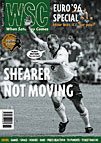 A view of the media and public reaction in Portugal to Euro '96. Phil Town reports
A view of the media and public reaction in Portugal to Euro '96. Phil Town reports
While the hopes and dreams of 20 million Portuguese worldwide crumbled during that second half capitulation against a 15-man defence and Poborsky, I’ll wager the most disappointed of all were the handful of advertising executives in Portugal who had, it seemed, set so much store on the national team going all the way.
Wilkinson Sword adopted Portugal’s colours and badge for their packaging and crammed their copy with subtle references to the game: “In Euro ’96, Wilkinson’s defence is going to shine. They might be made of iron but they’ll have to deal with our steely defence. Let’s concentrate on attack because Portugal is well defended.” The irony here, of course, is that it was patently obvious that very few of the Portuguese team had been within a hundred miles of a Wilkinson Sword for a substantial length of time, if we discount Oceano’s head.
It was on the telly that most liberty was taken with the game, as advertisers were granted the whole of half time to play with by RTP, the state channel. A mobile phone network Telecel ran a series of commercials featuring a game ostensibly between Portugal and England. In one, Rui Costa dribbles towards an English defender. A phone rings. He takes it out of his shorts, and answers it. “It’s for you,” he says to the defender, who replies, “Oh, thanks,” and is promptly nutmegged. In another, João Pinto (the man with a centre of gravity about two feet above his head) is floored. A phone rings. “Oh hi Mum. No, don’t worry, I’m all right.” In the Portuguese Spitting Image version, after he hangs up he aims a “filho da puta” (equivalent of fucking bastard) at the defender who clogged him.
The mother of all advertising campaigns here, however, was that designed by one of the official national team sponsors, Sagres, a best-selling beer. Their Euro ’96 campaign run on street posters got off to a sublime start: a full-size Eusebio, in colour against a black and white crowd, turns from scoring against North Korea in 1966 with the slogan: “The same thirst for victory – Sagres, our selection.” There followed a series of posters now with just a bottle or glass and a suitably pithy slogan. They may have put the mockers on further Portuguese progress when at the quarter-final stage posters appeared with an almost empty glass and the message “Final `a vista” (the end/final is in sight). The day after Portugal went out, the posters had a bottle encased in a block of ice and “Let’s keep our identity”. The message was clear – stay cool, it’s not the end of the world (and we still have Sagres). Opel, on the other hand, were not so quick to move. They were still publishing ads with João Pinto and the affirmation “Generation of winners” two days after the Czech game.
Delta coffee also tried to be as topical as possible, with new copy each time Portugal played. Before the Croatia game: “Today Croatia are going to discover what a Portuguese stew is.” Before the Czech game: “Today the Czech Republic are going to find out what a barbecued sardine feels like.”
My personal favourite of the whole month, though, was an ad for Norwegian bacalhau which appeared on the side of buses at the beginning of June. Bacalhau is dried, salted codfish, a national delicacy in Portugal. Before cooking you have to leave it in water for half a day, changing the water several times. In the ad, a player in Portuguese kit is on his knees, head in hands, having apparently just missed a goal or lost a game. No. “Dammit! I forgot to put the bacalhau in soak!”
The rest of the field had their work cut out.
From WSC 114 August 1996. What was happening this month